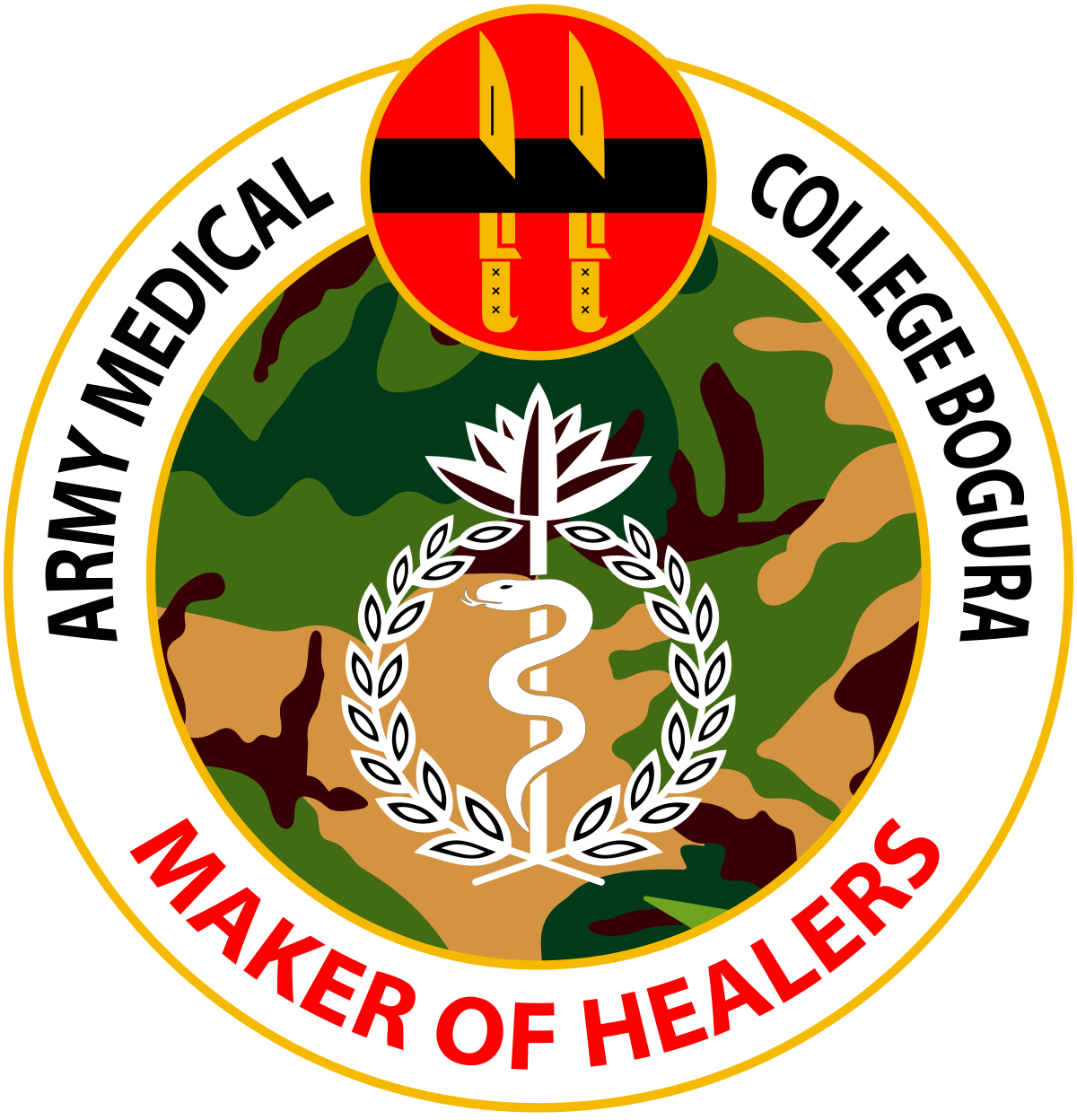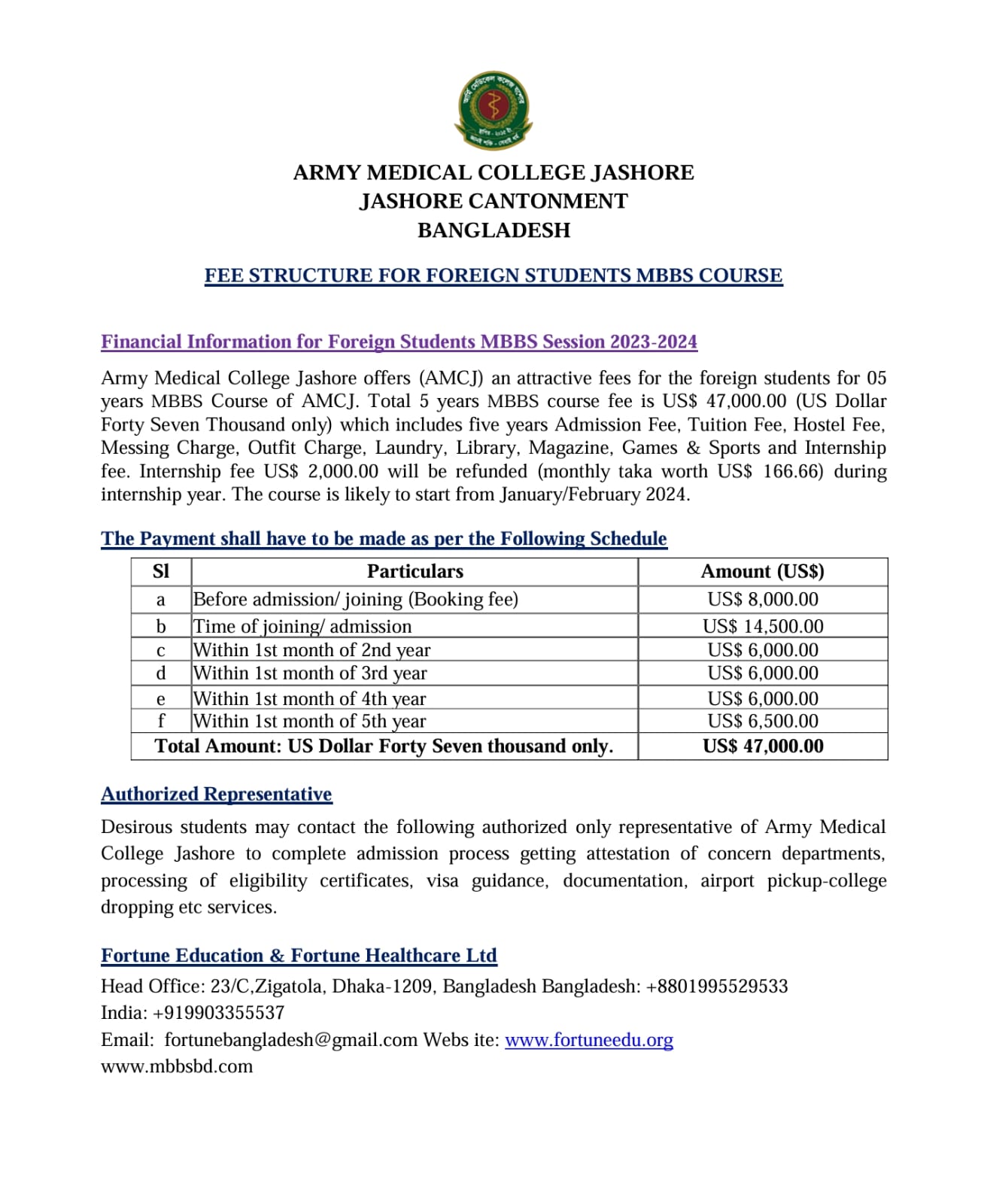The quality of education at Army Medical Colleges in Bangladesh is generally regarded as high, especially considering their rigorous academic standards, comprehensive curriculum, and the disciplined environment characteristic of military institutions. Here are some factors that contribute to the quality of education in these colleges:
Quality of Education at Army Medical Colleges in Bangladesh
Curriculum and Academic Standards: Army Medical Colleges in Bangladesh typically follow a curriculum that is on par with international medical education standards. The curriculum is comprehensive, covering a wide range of medical and healthcare subjects, and is regularly updated to include the latest developments in the field.
Faculty and Teaching Staff: These colleges often boast experienced and highly qualified teaching staff. Faculty members usually have a strong background in their respective fields, with many having international exposure and qualifications.
Clinical Training and Practical Exposure: Students at Army Medical Colleges receive extensive practical and clinical training. This is facilitated by the colleges’ affiliations with well-equipped military hospitals, providing students with hands-on experience in a real-world medical environment.
Infrastructure and Facilities: The colleges are equipped with modern facilities and infrastructure, including state-of-the-art laboratories, libraries with extensive medical literature, and advanced medical equipment. This enhances the learning experience and provides students with the resources they need for in-depth study and research.
Research Opportunities: Students are often encouraged to participate in research, which is an essential aspect of medical education. This not only enhances their learning experience but also contributes to their professional development.
Disciplined and Structured Environment: Being part of the military establishment, these colleges emphasize discipline, which can contribute positively to the students’ overall character development and professional demeanor.
Accreditation and Recognition: The degrees offered by Army Medical Colleges in Bangladesh are typically recognized by national and international medical councils, which is an important indicator of the quality of education provided.
Competitive Admission Process: The selection process for admission into these colleges is competitive, ensuring that only capable and dedicated students are admitted, which indirectly contributes to maintaining high educational standards.
Continuous Assessment and Feedback: These institutions often have a system of continuous assessment and feedback, which helps in closely monitoring students’ progress and providing necessary guidance.
Alumni Success: The success and performance of alumni in their respective fields can also be a good indicator of the quality of education. Graduates from Army Medical Colleges in Bangladesh often go on to have successful careers in various healthcare sectors.
It’s important to note that the experience and quality can vary from one institution to another. Prospective students should research specific colleges to understand their strengths, specializations, and reputations in the medical community.
Army Medical College Jashore (AMCJ)
Army Medical College Jashore (AMCJ) is one of the medical colleges under the umbrella of the Bangladesh Army. It’s part of the network of Army Medical Colleges that are known for providing quality medical education and training. While I don’t have the latest specific details about AMCJ, I can provide a general overview based on the standards typically upheld by Army Medical Colleges in Bangladesh:
Establishment and Affiliation: AMCJ, like other Army Medical Colleges, was established to cater to the increasing demand for medical professionals. These colleges are usually affiliated with a reputed university and recognized by the Bangladesh Medical and Dental Council (BM&DC).
Curriculum: The curriculum at AMCJ is likely to be comprehensive and in line with the latest global medical education standards, covering all major areas of medical science.
Faculty: The faculty at AMCJ is expected to be highly qualified, with a mix of experienced senior professors and dynamic young lecturers. Many of them might have national or international training and experience in their respective fields.
Facilities and Infrastructure: AMCJ probably boasts modern infrastructure with well-equipped classrooms, state-of-the-art laboratories, a resourceful library, and advanced medical equipment.
Clinical Training: Students at AMCJ would have access to clinical training opportunities, probably at affiliated military hospitals, which provide practical exposure to a wide range of medical conditions and treatments.
Research Opportunities: There may be opportunities for students to engage in research activities, an integral part of medical education and critical for developing analytical and critical thinking skills.
Student Life: The college likely offers a disciplined, yet vibrant campus life with various extracurricular activities, clubs, and sports facilities, contributing to the overall development of students.
Admission Process: Admissions are typically competitive, based on academic merit and performance in entrance examinations.
For the most accurate and detailed information about Army Medical College Jashore, including admission requirements, fee structure, faculty details, and specific facilities, it would be best to visit their official website or contact the college directly. This will provide the latest information and any specific details relevant to your interests or needs.
Army Medical College Cumilla (AMCCu)
Army Medical College Cumilla (AMCCu) is one of the several Army Medical Colleges in Bangladesh, established as part of an initiative to provide advanced medical education and to produce competent healthcare professionals. While I don’t have the latest specific information on AMCCu, I can provide a general overview based on the common characteristics and standards of Army Medical Colleges in Bangladesh:
Establishment and Objective: Army Medical College Cumilla, like its counterparts, was established under the auspices of the Bangladesh Army, aiming to provide high-quality medical education and to contribute to the healthcare sector of Bangladesh.
Affiliation and Accreditation: Typically, Army Medical Colleges in Bangladesh are affiliated with a renowned medical university and are recognized by the Bangladesh Medical and Dental Council (BM&DC). This ensures that the degree awarded is credible and meets national and international standards.
Curriculum: The curriculum at AMCCu is likely to be comprehensive, covering all essential areas of medical education, and is designed to meet global standards. This includes theoretical knowledge as well as practical clinical skills.
Faculty: The faculty at Army Medical Colleges usually comprises experienced and highly qualified medical professionals and educators. They often bring a mix of practical experience and academic expertise to the classroom.
Infrastructure and Facilities: AMCCu is expected to have modern infrastructure, including well-equipped classrooms, advanced laboratories, a rich library with a vast collection of medical literature, and possibly state-of-the-art medical technologies for student training.
Clinical Training: Students at AMCCu would typically receive practical clinical training, possibly at affiliated military hospitals or healthcare centers. This hands-on experience is crucial for developing competent medical practitioners.
Research Opportunities: Opportunities for research and involvement in various academic and scientific projects might be available, fostering a culture of inquiry and innovation among students.
Student Life and Extracurricular Activities: Army Medical Colleges usually provide a disciplined yet enriching environment for students, with opportunities for extracurricular activities, sports, and cultural events, contributing to the holistic development of students.
Admission Process: Admissions are generally competitive, with candidates being selected based on their academic achievements and performance in relevant entrance examinations.
For specific information regarding Army Medical College Cumilla, such as admission details, fee structure, faculty qualifications, and campus life, it is best to consult the official website or directly contact the college. They can provide the most accurate and up-to-date information.
Army Medical College Bogura (AMCB)
Army Medical College Bogura (AMCB) is part of the network of Army Medical Colleges in Bangladesh, established under the supervision of the Bangladesh Army. These colleges are known for their commitment to providing quality medical education and producing skilled healthcare professionals. Here’s a general overview of what you might expect from Army Medical College Bogura, based on the standards and practices common to Army Medical Colleges in Bangladesh:
Establishment and Mission: AMCB, like other Army Medical Colleges, was established with the goal of enhancing medical education in Bangladesh and addressing the need for qualified medical practitioners. The college likely operates under the mission to deliver high-standard medical education and to contribute positively to the healthcare sector.
Affiliation and Recognition: Army Medical Colleges are typically affiliated with a major medical university and recognized by the Bangladesh Medical and Dental Council (BM&DC). This ensures that the degrees they offer are credible and align with national and international educational standards.
Curriculum: The curriculum at AMCB is expected to be comprehensive, encompassing both theoretical knowledge and practical skills in various medical disciplines, in line with contemporary medical education standards.
Faculty: The faculty at AMCB probably includes experienced and highly qualified medical educators, many of whom may have significant clinical and academic experience. This ensures a high level of instruction and mentorship for students.
Facilities and Infrastructure: Modern infrastructure, including advanced laboratories, well-stocked libraries, and up-to-date medical equipment, is a hallmark of Army Medical Colleges. AMCB likely offers these facilities to enhance the learning experience of its students.
Clinical Training: Practical clinical training is a key component of medical education. AMCB students would typically have opportunities for hands-on clinical experiences, possibly at affiliated military or civilian hospitals.
Research Opportunities: There may be opportunities for students to engage in medical research, an important aspect of medical studies that fosters critical thinking and scientific inquiry.
Student Life: Apart from academics, Army Medical Colleges often focus on the overall development of students, providing opportunities for extracurricular activities, sports, and cultural events within a disciplined environment.
Admission Criteria: Admission to AMCB is likely competitive, based on academic merit and performance in entrance examinations, similar to other Army Medical Colleges.
For the most accurate and detailed information about Army Medical College Bogura, including specific admission procedures, tuition fees, faculty qualifications, and campus facilities, it’s advisable to check their official website or contact the college directly. This will ensure you have the latest and most relevant information.
MBBS Fees Structure of Army Medical College
The fee structure for MBBS programs at Army Medical Colleges in Bangladesh can vary from one institution to another and may also be subject to change over time. However, I can provide a general overview of the types of fees and costs you might expect. Keep in mind that for the most accurate and current information, it’s best to contact the specific Army Medical College you are interested in or visit their official website.
Admission Fees: This is a one-time fee payable at the time of admission. It can vary significantly based on the college.
Tuition Fees: This is the regular fee that students pay, usually on an annual or semester basis. The amount can differ between colleges.
Laboratory Fees: Some colleges may charge additional fees for the use of laboratory facilities.
Hostel Fees: If you require accommodation, there might be separate charges for hostel facilities. This typically includes room charges and possibly, utility costs.
Mess/Cafeteria Fees: For food and dining services, there may be separate charges, especially if you opt for hostel accommodation.
Miscellaneous Fees: These can include charges for library use, sports facilities, student activities, examination fees, etc.
Fees for International Students: International students often have a different fee structure compared to local students. This fee structure can be significantly higher.
Scholarships and Financial Aid: Some colleges might offer scholarships or financial aid options, which can reduce the overall cost for eligible students.
Payment Plans: Colleges may offer different payment plans, allowing students to pay fees in installments rather than a lump sum.
The total cost of completing an MBBS program at an Army Medical College in Bangladesh includes not just the academic fees but also living expenses, textbooks, and any other personal expenses. To plan effectively, it’s important to consider all these aspects.
For specific fee details of a particular Army Medical College (like Army Medical College Jashore, Cumilla, or Bogura), you would need to consult their official communication channels. Fee structures are subject to change and can be updated annually.




